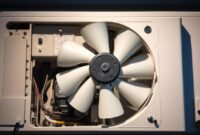The scorching heat of summer can be intolerable if your air conditioning (AC) unit is not functioning correctly. Sadly, AC units can develop problems, one of the most frequent issues.
A frozen air conditioning system can lead to a lack of cooling in your home, potentially causing water damage and more significant issues if not promptly resolved. This article will guide you on how to tell if your AC is frozen, including identifying a frozen AC line and understanding the causes behind a frozen air conditioning system.
How to Tell if AC is Frozen?
The primary indication of a frozen AC unit is the absence of cold air circulating through the vents. Instead, warm air or no airflow may be noticeable. The second indicator is the presence of condensation or ice accumulation on the AC unit.

The ice may develop on the unit’s exterior, the evaporator coil, or the refrigerant lines. Finally, a hissing or bubbling sound from the AC unit might imply a frozen evaporator coil.
How to Tell if the AC Line is Frozen?
The AC line is crucial in transporting refrigerant to the evaporator coil to cool the air. If the AC line freezes, the refrigerant is obstructed from flowing through the line, causing the AC unit to cease working. To determine if the AC line is frozen, it is necessary to turn off the AC unit and allow it to thaw for several hours.
After thawing, restart the AC unit and sense the temperature of the air emitted from the vents. If the air is cool, the AC line is not frozen. If the air is warm, it indicates that the AC line is probably frozen, requiring the assistance of a professional to diagnose and resolve the issue.
How to Tell if an AC Compressor is Frozen?
There are several signs that your AC compressor may be frozen, including warm airflow, ice on the compressor, reduced airflow, strange noises, and a tripped circuit breaker.
If the air from your AC unit is not as cool as it should be or you notice ice accumulation on the compressor, it indicates that the compressor is frozen. A frozen compressor can also cause reduced or restricted airflow and strange sounds, such as grinding or squealing noises from the compressor or the unit.
Additionally, a frozen AC compressor can cause the circuit breaker to trip, which may indicate that the compressor is frozen. Calling a professional to diagnose and fix the issue is best if you notice any of these signs.
Why is My AC Frozen?
There are multiple reasons why your air conditioning system might freeze up, and addressing these issues promptly is crucial to prevent water damage and further complications. A common cause is a clogged or dirty air filter, which restricts airflow.
This can lead to a frozen evaporator coil, as well as issues with the condensate drain, exacerbating the problem.
Another cause of a frozen AC unit is low refrigerant levels, which can lead to an overly cold evaporator coil. If you suspect that low refrigerant levels are the cause of your frozen AC unit, it is best to seek professional help to add more refrigerant.
A malfunctioning thermostat can also cause your AC unit to freeze. If your thermostat is not signaling the AC unit to turn off when it reaches the desired temperature, the evaporator coil can freeze. Thus, checking your thermostat to ensure it works correctly and replacing it if necessary can help prevent this issue.
Will frozen ac fix itself? If your air conditioner is frozen, it won’t fix itself. You should let it thaw off before turning it back on. If you keep running it while it’s frozen, it could get damaged and cost more to fix. So take care of it and let it thaw before using it again!
Read also: Why Air Conditioner Keeps Running When Turned Off?
So, how to tell if ac is frozen? If you detect any indications that your AC unit may be frozen, such as warm air coming out of the vents, ice accumulation on the unit, or a hissing or bubbling sound, switch off the unit and allow it to thaw before seeking professional assistance to determine and repair the problem.


